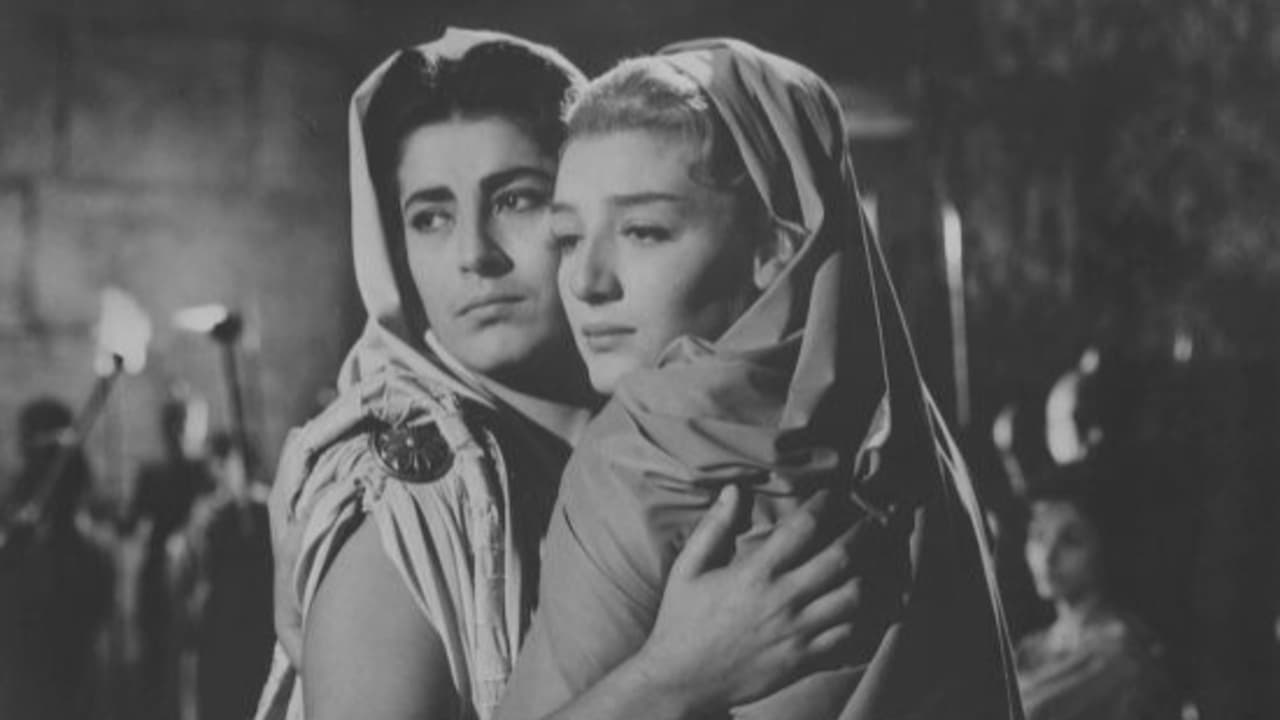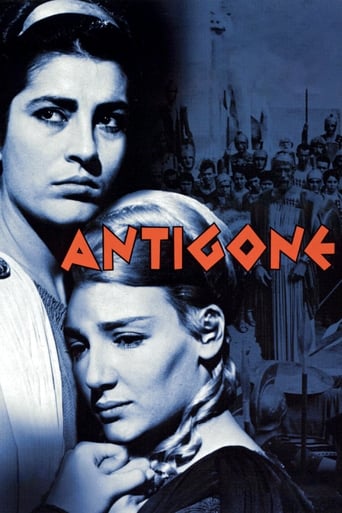Kattiera Nana
I think this is a new genre that they're all sort of working their way through it and haven't got all the kinks worked out yet but it's a genre that works for me.
ChanFamous
I wanted to like it more than I actually did... But much of the humor totally escaped me and I walked out only mildly impressed.
Orla Zuniga
It is interesting even when nothing much happens, which is for most of its 3-hour running time. Read full review
Rosie Searle
It's the kind of movie you'll want to see a second time with someone who hasn't seen it yet, to remember what it was like to watch it for the first time.
mbroullire
Antigone, written by Sophocles, is a characteristic Greek tragedy where the city's king, Creon, is faced with a moral dilemma that eventually hastens his fall from grace. Set in antiquity, the movie's plot is designed to question presupposed ideas of justice and wisdom as they were seen through the ancient Greek perspective. In the movie, the protagonist, Antigone, is faced with a moral dilemma after her king, Creon, orders that her brother should be left unburied (a terrible punishment in ancient Greek culture since it would prevent his passage through the river Styx). Eventually, Despite the king's decree, Antigone decided that her brother's death with-out burial was unjust and challenged Creon's authority to prevent his burial by performing the ritual herself. After the discovery of her crime, Creon sentences Antigone to death – an act that created a great deal of unpopularity in the kingdom and incited lines of questioning very similar to contemporary Socratic arguments.Creon's decision to sentence Antigone to death and her brother to a hellish afterlife were seen as unjust and despotic by the people of Thebes and caused his wisdom/authority to be questioned. Since ancient Greeks believed that the Sovereign set the morality of their city state, the act of questioning alone represents Socratic argument. Sophocles sets up questioning, in a manner very similar to Socratic arguments made through Euthyphro and Apology, by using Creon's own son and oracle to test Creon's judgment in an attempt to show that just being a king does not make someone wise or knowledgeable of justice. The morality of Antigone eventually surfaces after Creon's fall from grace. At the end of the movie, Creon finally sees the error of his ways but Sophocles uses his downfall to express how even king's judgment can be governed through hubris instead of actual wisdom.
haidennunn
The movie, Antigone is based on Sophocles' tragic play. It follows the play's plot perfectly, and does a great job showing the emotional responses of the characters. There is great turmoil within the city after Oedipus left because of exile. His two sons, Polynices and Eteocles are fighting with one another because Polynices raised an army to fight against Thebes. They ended up killing one another leaving Oedipus' two daughters, Antigone and Ismene. Creon was named king after Oedipus left, and he decided that a proper burial should happen for Eteocles, the brother that died as a hero defending his city. As for Polynices, King Creon decided that he was not worthy of a proper burial, and his body must be left unburied for the animals and scavengers. When Antigone heard his edict, she was shocked and upset that King Creon was not going to give both brothers a burial. She plotted against him and decided she would bury him herself. She goes to her sister Ismene for support in her decision, but Ismene wanted no part in Antigone's plan. When the people of Thebes discovered who buried Polynices' body, they were shocked. King Creon sentenced Antigone to death for disobeying his law even though she was engaged to his son, Haemon. He told his people that the laws are the laws and no one is exempt from them, not even his family. The plot quickly turns tragic when Antigone hangs herself in the cave she was sealed in. When Haemon finds her, he is so stricken with grief and anger that he lashes out at his father and ends up killing himself.With this story, there are two major ethical dilemmas that the characters are faced with. Antigone's dilemma deals with her religion and belief that the Gods command all bodies to be buried, and they will cause unhappiness within the city and her family if these commands are not followed. She is also trying to grieve for her lost brother in the best way that she knows how, being a dedicated and honoring sister by burying his body. Antigone was handed a hard circumstance in which she had to choose between the honor and loyalty of her Gods and Family or choose to obey the King. King Creon's dilemma is the fact that his soon to be daughter-in-law disobeyed him, and he has to treat her like a regular citizen in order to maintain the respect he has from the citizens of Thebes. If she was pardoned from the law, other people would start to use that as an excuse to stop following the laws and orders of the King. These two dilemmas are in direct relation to Plato's idea of justice and what is right and wrong. According to Plato's accounts of Socrates' dialogues in Crito and Apology, justice is never doing wrong or causing harm to anyone. In this movie, Antigone felt that it was an injustice to her family and her brother to not bury his body, and it was wrong and unjust in the eyes of the Gods. As Euthyphro would say, it was an impiety to the Gods to leave his body unburied.
burnum-686-537338
Moral claims do not give rise to philosophical grounds. Yet, In Antigone it is clear that moral actions prompt philosophical questions, and inherently make good drama.This review acts as a strict focus on how moral and ethical points are made throughout the film, and how they act as catalysts to progress the story and keep the viewer involved. Be it known that I have not read the Sopheclean text of Antigone, and fully derive all of my comments and criticisms solely within the boundaries of the film.The character flaws present in the film mostly derive from wayward and distorted adherences to moral ideologies. For example, Antigone's ethical and moral backbone throughout the film is guided by powerful intangibles like love and loneliness, which makes her rash and at times misguided. Creon's moral code is also in knots as he acts as a Euthyphro in the fact that he is conflicted and contradictory to many of his beliefs that shape him, i.e. his aforementioned moral code. Values undoubtedly shaped the society of Ancient Greece. Loyalty was a cornerstone value in this society, yet loyalty drifts and fades as tides turn in Antigone. For example, as Creon is crowned King of Thebes he is shown immediate support as the new benevolent King, yet mourning for Oedipus, or any mention of him whatsoever is non existent. Is this a loyal Thebes? Though support of Creon was warranted by his grace, the remembrances of a fallen king laid flat. As Creon sits on his thrown surrounded by his court he states, "The country's foe is always mine." Little did Creon know that he was the biggest threat to his country, and thus his own foe. Because of the nature of Greek Tragedies and the intuition of most people, the common viewer could understand this at first glimpse. It was clear that Creon's hubris and pride would be his downfall.Antigone, acting as the protagonist in the film, is the embodiment of good. Yet, contradictions within her moral ideology leads to questioning what "good" actually is. Is her entire moral and ethical embodiment good? Is it her choices of which moral standpoints to act upon that are what is good? Or is it her actions that are good? Simply put, Antigone is a walking paradox. It is impossible to know what is good. Acting against Zeus due to her undying love and care for her brother, or burying her brother because it is just in the Gods' eyes to do so. Both are contradictory and both can be good.It is clear that both the protagonist and antagonist have inner conflicts. Their inner ideologies contradict. What makes one a "protagonist" and another an "antagonist" lies in the fact that the shared ideologies between them also conflict. Inner contradictions within an individual which conflict with another individuals already clashing ideologies makes it impossible to know who is right and who is wrong. Both characters were acting upon the same ethical grounds. They acted to safeguard human law, religious law, and family values. Is it then that moral grounds are shaped by convenience and circumstance? Does one's moral backbone fit the skeleton of a different distortion of themselves? Is moral rectitude a variable of space and time? Is it the contradictions of moral standpoints that are convenient because they can be malleable to fit any form? These are the questions that I believe the film poses. The film does a fantastic job at examining exactly what grants a legitimate moral claim or action, which most people are curious about. Reason is man's most precious gift, and by the will of nature, the tone of his reasoning is determined by his moral code.
Spoon-5
A simple Greek tragedy plot with good acting. Watch out for that loud suspense music and pay attention to the subtitles and you should enjoy it OK.For as simple as the plot was, though, it could have been a shorter movie. That just means that when you're finished watching, you'll feel like you've accomplished something.

